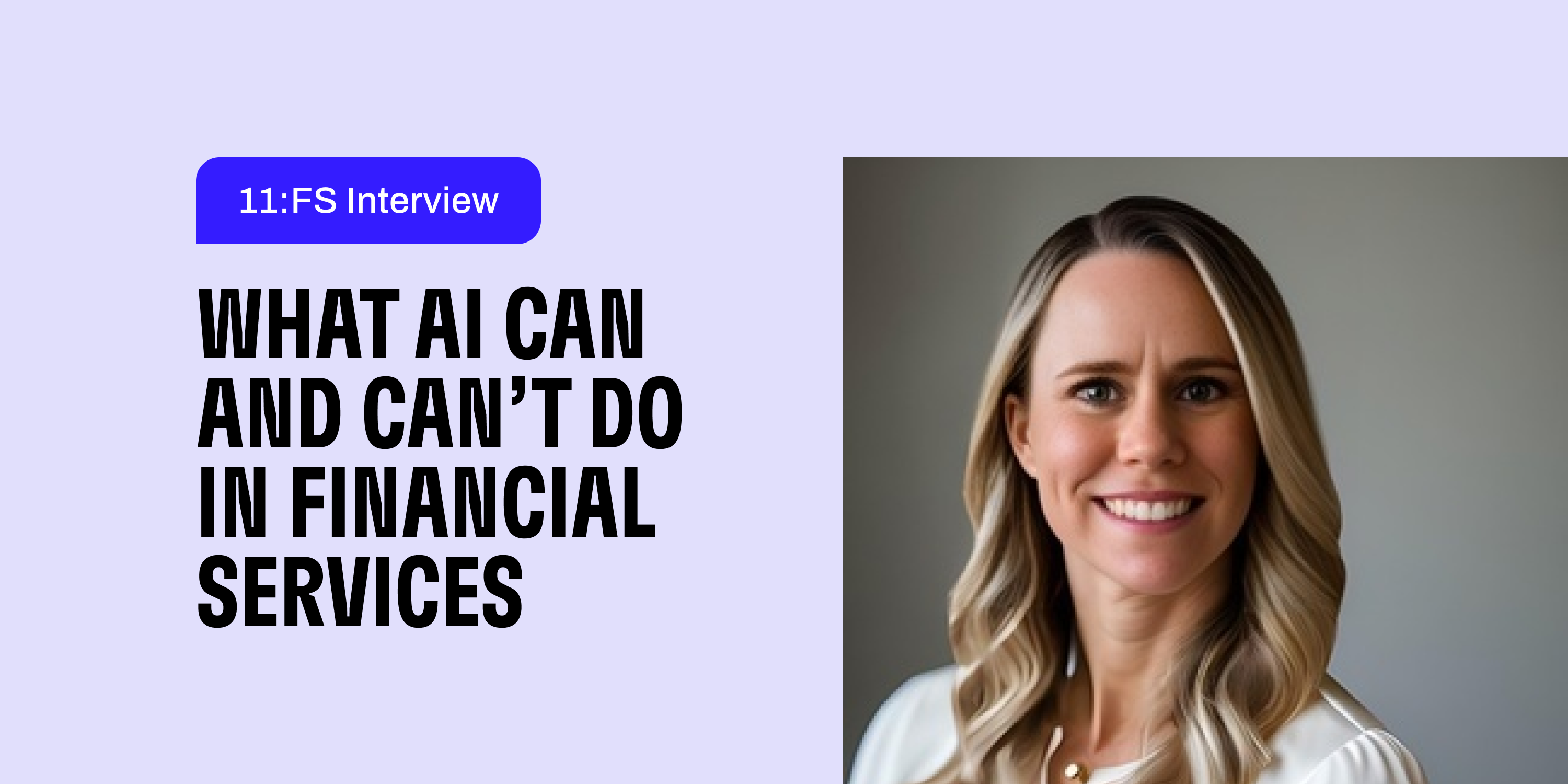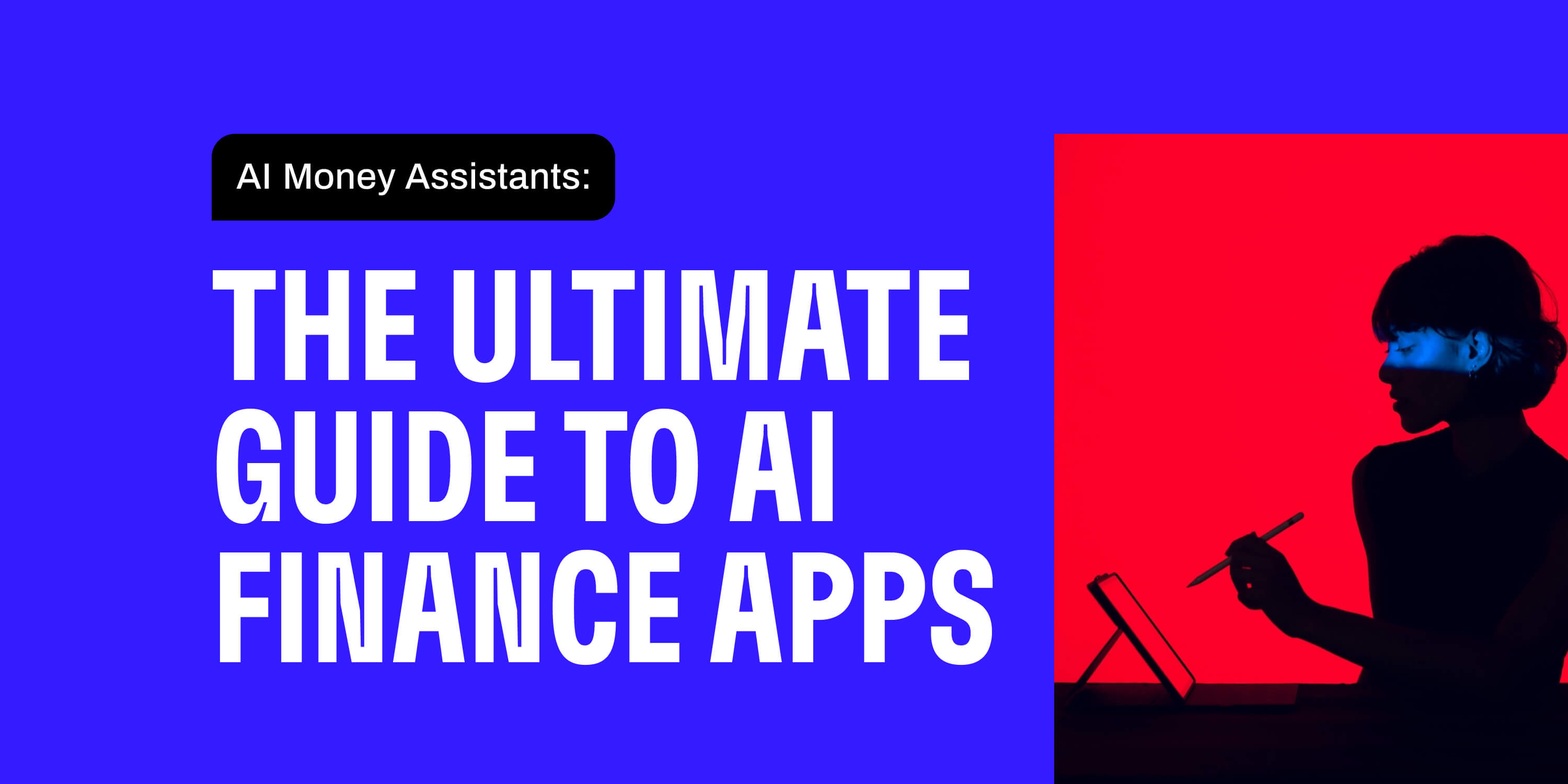.png)
Harnessing the power of AI for financial wellbeing
A few weeks ago Cleo's Founder, Barney, sat down with 11:FS to chat about AI and why the future of finance is a digital assistant.
This is some text inside of a div block with Cleo CTA
CTASigning up takes 2 minutes. Scan this QR code to send the app to your phone.

ICYMI: Cleo's Senior Machine Learning PM, Kate Janssen dropped by the studios at 11:FS to chat AI + Fintech with some of London's biggest brains.

A few weeks ago, Kate Janssen, Cleo's Senior ML Product Manager, sat down with David Brear from 11:FS, Nick Parfitt, Principal AML - SME at Feedzai and Jason Maude, Chief Technology Advocate at Starling Bank.
The topic for this genius bar– what AI can and can't do in financial services.
Here's a few of the highlights from their time together, summarized by our dear friend ChatGPT.
David: Setting aside other issues for a moment, today, we'll focus on AI. It seems many from the crypto space have shifted their attention to AI, touting themselves as specialists. Everywhere, we see tools, cheat sheets, and resources about AI. Although AI isn’t new, it has gained momentum recently. Kate, considering machine learning has been utilized in financial services for quite some time, what's your take on its evolution?
Kate: Indeed, machine learning has been around and implemented in banking and fintech for years. The machine learning I'm referencing is the classical kind, which has seen vast development since 2010 and sometimes even before. What's new and creating a buzz is the emergence of generative AI. This took off last November with OpenAI's release. It's this type of AI that's capturing everyone's attention. But we must remember that machine learning has been around and has always been significant.
David: As a long-time industry insider, do you feel AI’s rise to popularity is akin to an indie band going mainstream? The term "AI" covers a broad spectrum of technologies. Nick, when you hear "AI", what comes to your mind?
Nick: Traditionally, AI helps identify patterns beyond human capability, especially on a large scale. It aids in directing analysts towards potentially suspicious transactions within payment networks that warrant deeper investigation. But generative AI presents even bigger opportunities, which we'll delve into later. The challenge is aligning this tech with regulatory standards. AI helps in processing an immense amount of data, filtering out noise, and focusing on relevant signals. With criminals becoming smarter and employing AI-driven techniques, we're in an arms race to keep financial systems secure.
David: There's been a surge of AI adoption across various industries. How do you see its evolution within financial services?
Jason: Financial sectors are typically more conservative than others because they handle people's money. They need to ensure that their tech solutions are reliable. Echoing Nick's sentiment, the challenge is determining how to prevent malicious actors from exploiting vast networks. This problem isn't exclusive to finance; platforms like Facebook, Twitter, YouTube, and Google also grapple with this. AI is a promising tool to help secure these networks and prevent misuse.
David: Banks are facing myriad challenges. On one hand, there's the allure of technologies like generative AI. On the other, many banks are grappling with legacy technological issues. While they may project a digital facade, behind the scenes, many still operate with outdated systems, paperwork, and archaic organizational structures. Given this, should they aim to adopt current technology standards, with AI playing a significant role?
Kate: Companies emerging today—startups and scale-ups—benefit from innovation, allowing them to quickly reach the market. In contrast, established banks have distribution channels but often lack innovation. By the decade's end, I foresee two types of companies: those integrating AI in every aspect and those that don't exist. While AI's integration into products is evident, its role in enhancing internal processes is equally crucial. The challenge lies in balancing innovation and distribution.
David: Jason, what's your perspective?
Jason: The age-old debate of innovation versus distribution, where startups bring innovation and large entities bring distribution, is intriguing. However, there are anomalies like Starling that challenge these categories. We aim to combine the strengths of both, ensuring reliability and agility coexist rather than conflict. It's futile to focus on advanced technologies like generative AI when foundational tech infrastructure is outdated. Combining 70s-era code with cutting-edge AI is like connecting two modern buildings with a stone bridge—it's incongruous. Before leaping into advanced tech, banks must first modernize their existing systems. Moreover, an organizational culture shift is essential. If a bank isn't equipped for the rapid pace of modern software development, especially AI, it should consider outsourcing to those who specialize in it.
David: Our three organizations began from different starting points, each carrying its own unique culture, structure, and processes. The challenge isn't just about adapting to new technologies because they're trendy. I'd like to focus our discussion on the potential use cases of AI, particularly in improving customer experience and the broader opportunities it opens up for financial services, from front-end experiences to backend operations.
Nick: There's a challenge with Suspicious Activity Reports (SARs). A significant number of them end up not being actionable, and banks often lament the lack of feedback. When we look at fraud detection, machine learning has proven beneficial. However, with anti-money laundering (AML), it's a more intricate process. As more collaboration between banks and authorities emerges, especially in data sharing, we'll likely make better strides in this area. Presently, AI's ability to identify and analyze transactional patterns, especially when linked to fraud signals, offers an avenue to counteract money laundering more effectively.
David: As technology continues to advance, do you believe we're becoming better equipped to detect and combat fraud? Or are we simply in an ongoing cycle with adversaries always evolving in tandem?
Nick: While complete eradication of threats like fraud or money laundering is ambitious, technology, especially AI, is indeed giving us an edge. It's refining our approach from a broad-brush strategy to one where we can zoom in on higher-risk activities or behaviors. AI's strength lies in efficiently processing vast amounts of data and identifying threats, thus reducing the need to continuously increase manpower.
David: AI's rapid rise has led to concerns about potential job losses. In the evolving landscape of the industry, are you witnessing a notable shift in job roles or the emergence of new ones?
Kate: AI is undeniably transformative. It will undoubtedly reshape the organizational structure, leading to the evolution of certain roles and the emergence of new ones, such as data scientists or machine learning engineers. My vision of the future is not one where AI replaces humans but one where they collaboratively work to achieve better outcomes. Although the rapid technological shifts of today feel unprecedented, history shows us, through events like the Industrial Revolution, that humanity has navigated such transformative periods before.
David: With the integration of new technologies in financial services, regulatory bodies often play a pivotal role. Given the inherent complexities in explaining AI models, how can regulators ensure both innovation and consumer safety?
Jason: For regulators, the challenge is twofold: identifying the potential risks AI poses and ensuring consumer safety. Machine learning models, by their nature, can be challenging to decipher, but our aim should be transparency. Regulators might push for models that are not only well-documented but also transparent in how decisions are reached. This transparency would aid in making these often intricate processes more understandable to the consumer.
This is just the tip of the machine learning iceberg – give the second half of the panel discussion a listen over at 11:FS Fintech Insider podcast.
Otherwise we've got loads of content related to AI personal finance and fintech right here, on this very blog. Even a whole section on how we're building Cleo and the challenges we come up against every day.
.png)
A few weeks ago Cleo's Founder, Barney, sat down with 11:FS to chat about AI and why the future of finance is a digital assistant.

Everything you need to know about how AI money apps can help your finances

How an AI personal budget can make the whole money thing way more chill

